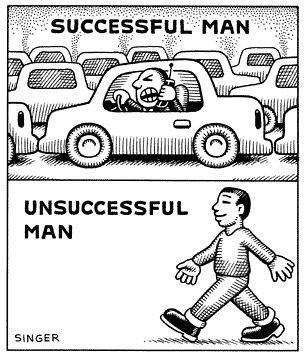
I watched an hour of prime time television last night. I'm not entirely TV-free; I probably watch about two hours a week. Last night the stars all fell into alignment and I watched an episode of House. (My daughter the actress says that Laurie's gift is timing; he delivers all of these deadpan lines with absolute perfection.) For the record, I enjoy the show; I just don't often stay up that late on Mondays.
Anyway, just for the fun of it, I counted the number of automobile (and related) commercials. In the space of one hour I saw six commercials. (I say related because one was a Les Schwab advertisement. Les Schwab is a great place, but it really has no goods or services to offer you unless you own or maintain an automobile.)
An aside: the basics of human memory...
In graduate school at Georgia Tech we extensively studied human intelligence as part of my artificial intelligence (AI) curriculum. There was (and still is) a huge gap between human intelligence and what we've been able to achieve with computers, but the hope still remains, even today, that as we understand human intelligence better we might be able to achieve some rough semblance thereof with computers.
Anyway, one of the things we studied was the model of memory. Humans have three types of memory: short term, intermediate term, and long term. Short term memory is principally auditory, lasts up to about 30 seconds, and can hold about five to seven items. Imagine reading a telephone number and then punching it into your phone. Intermediate term lasts from 30 minutes to two hours, and long term is how your grandparents regale you with stories of walking barefoot in the snow uphill both ways to school when they were young.
We know (thanks again to the experimental psychologists) that memories are created and stored strictly in this pipeline, moving first in short term, some of the short term memories making it to intermediate term, and some of those making it to long term. I helped my son learn the state capitols one day in middle school by using my AI background, burning the knowledge into his intermediate term memory and then burning it repeatedly at one hour intervals through the evening. He still remembers them :-)
There are even aphasias where one of the three types of memory are disrupted. I have a personal experience with short term memory disruption. About three years ago I suffered a completely mysterious bicycle crash. I say mysterious because I was riding alone, though there were a couple of witnesses on the street when it happened. I say mysterious because when I replay my recollection of the event there is a profound...discontinuity...in the recollection; one moment I'm riding along the street, and the next I'm standing by the bicycle inspecting it for damage with people running up to me asking if I was all right. (Well, I wasn't, not really, but that's another story.) Short term memory disruption is not uncommon with mild concussions, and my AI background allows me to understand the mechanism, but it was still downright creepy to experience it.
Anyway, back to House.
By including advertisements for automobiles at such frequent intervals, Big Business is essentially pounding their messages into long-term memory. The messages are things like,
- Cars are fun.
- Cars are glamorous.
- You need a car.
- Everyone should have a car.
- Caution: Cigarette Smoking May be Hazardous to Your Health (1966)
- Warning: The Surgeon General Has Determined that Cigarette Smoking is Dangerous to Your Health (1970)
- SURGEON GENERAL'S WARNING: Smoking Causes Lung Cancer, Heart Disease, Emphysema, And May Complicate Pregnancy.
- SURGEON GENERAL'S WARNING: Quitting Smoking Now Greatly Reduces Serious Risks to Your Health.
- SURGEON GENERAL'S WARNING: Smoking By Pregnant Women May Result in Fetal Injury, Premature Birth, And Low Birth Weight.
- SURGEON GENERAL'S WARNING: Cigarette Smoke Contains Carbon Monoxide.
- DEPT HOMELAND SECURITY WARNING: Foreign Oil Funds Anti-American Terrorism.
- SURGEON GENERAL'S WARNING: Automobile Use Causes Cancer in Children.
- SURGEON GENERAL'S WARNING: Automobile Use May Cause Obesity, Diabetes, and Heart Disease.
- ENVIRONMENTAL PROTECTION AGENCY WARNING: Automobile Use Destroys Farmland, Fisheries, and Wildlife Habitat.
- US DEPT COMMERCE WARNING: Private Automobiles Have Made the US a Debtor Nation.
- UNITED NATIONS WARNING: Private Automobiles Have Caused Global Warming.





2 comments:
I'd suggest something along the lines of:
DEPARTMENT OF JUSTICE WARNING: Motorists are responsible for 45,000 American deaths per year.
SURGEON GENERAL'S WARNING: Motorists maim and kill.
U.S. DEPARTMENT OF ENERGY: Automobiles are one of the (perhaps THE) least energy (and cost) efficient modes of transportation in urban environments.
Post a Comment